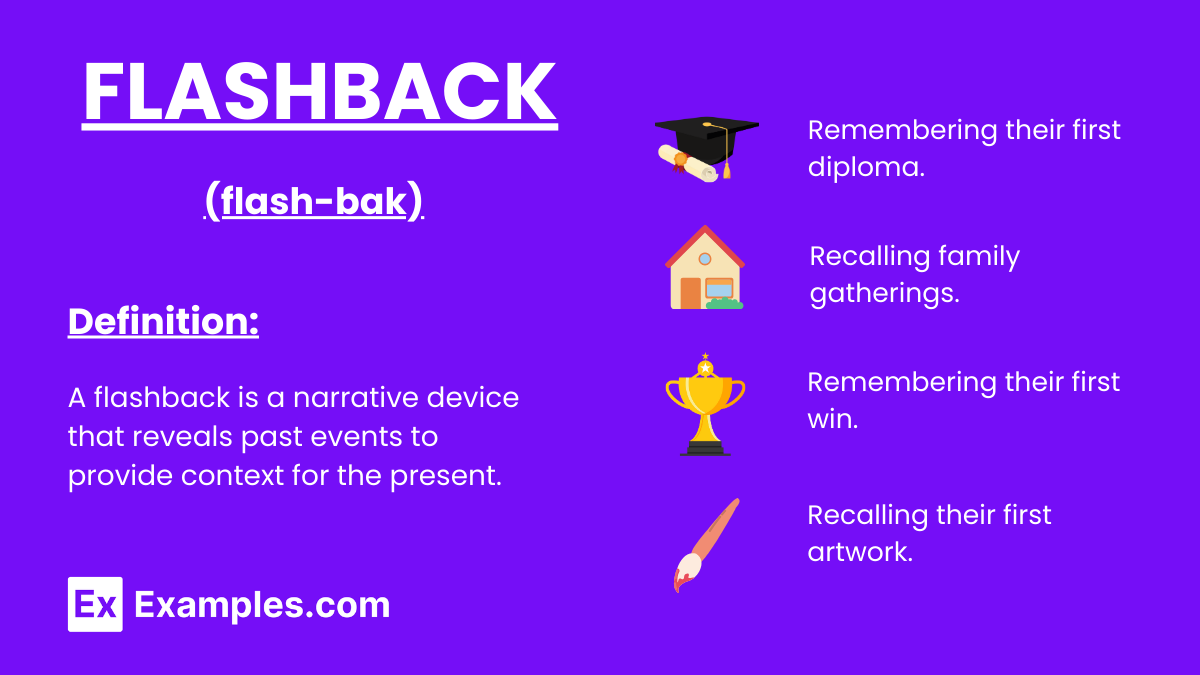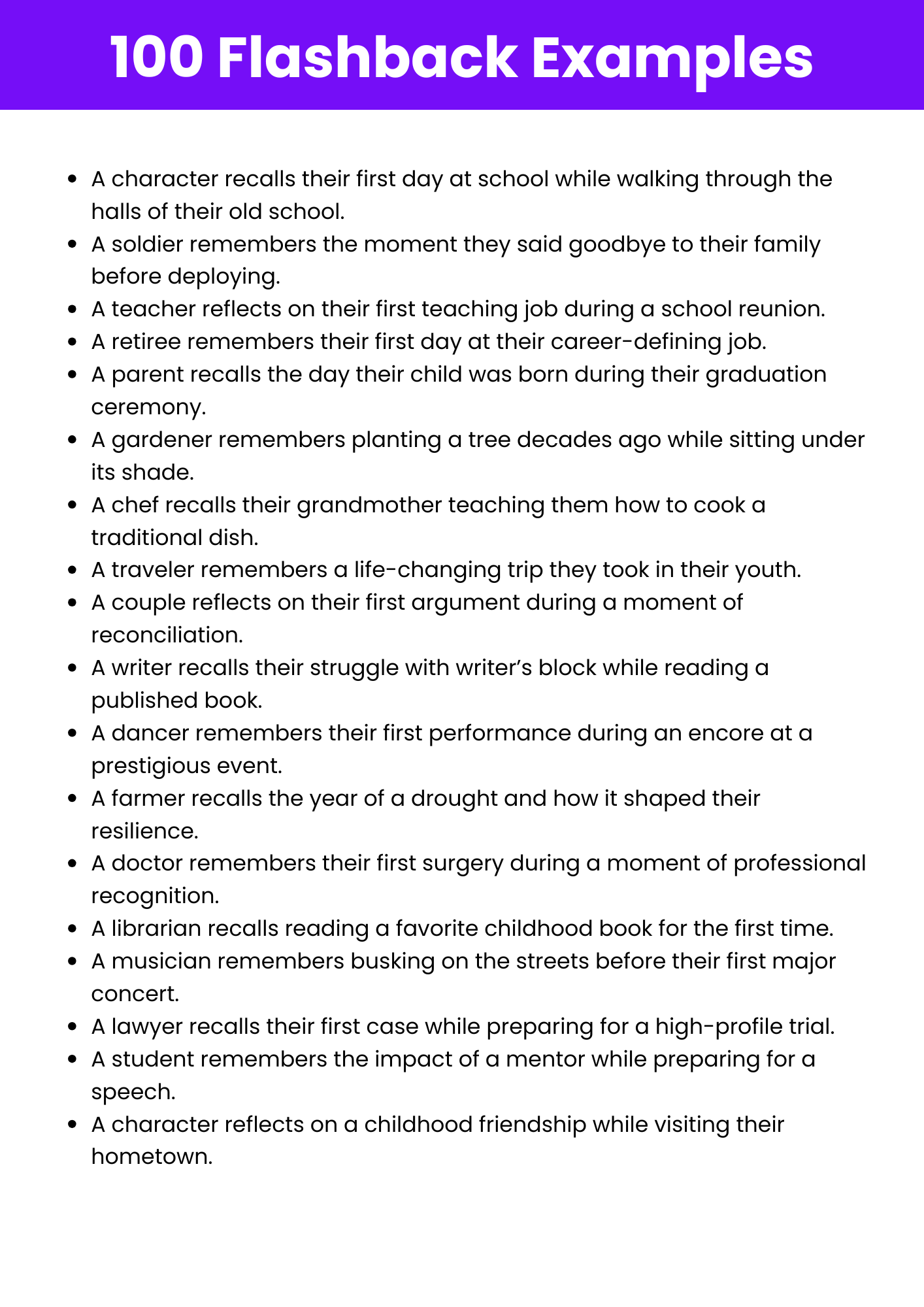Flashback
What is Flashback? – Definition
Flashback is a literary device used to interrupt the chronological sequence of a narrative to revisit past events, providing context, background, or insight into a character or situation.

Generated Flashback Examples

Download Flashback Examples
Enhance your understanding with our comprehensive PDF guide.
Download PDFExamples of Flashback
- A character recalling their childhood in a dramatic film.
- A novel describing a protagonist’s first day at school.
- A lecture explaining a historical event through flashback examples.
- A war veteran recounting a pivotal battle in a memoir.
- A family discussing a memorable vacation in a movie scene.
- A writer narrating their creative journey in an autobiography.
- A storyteller reflecting on a life-changing decision.
- A therapy session where a character revisits past trauma.
- A poem depicting vivid childhood memories of a garden.
- A character reliving a critical moment in their career journey.
- A movie scene showing a hero’s origin story through flashback.
- A photographer recounting their first breakthrough moment.
- A teacher sharing their first teaching experience in a classroom.
- A pet owner recalling their first day with their beloved pet.
- An astronaut remembering their first rocket launch in a documentary.
- A motivational speaker recalling a life-changing moment.
- A health expert reflecting on their journey to fitness.
- An artist sharing the inspiration behind a masterpiece.
- A graduation speech reflecting on the struggles of college life.
- A doctor narrating their first surgery experience in a TV drama.
- A character in a novel recalling a meaningful friendship.
- A pilot remembering their first solo flight in a biography.
- An athlete reminiscing about their first championship win.
- A diary entry reflecting on a pivotal day in the past.
- A movie scene where a character recalls their wedding day.
- A mystery novel revealing clues through a flashback.
- A nature documentary showing a flashback to earlier landscapes.
- A character recounting a life-changing storm from their past.
- A memoir describing the writer’s first job experience.
- A motivational book discussing a turning point in the author’s life.
Types of Flashback
Personal Flashbacks
Flashbacks that focus on a character’s individual experiences or memories.
- A character recalling their first day of school.
- A protagonist remembering their happiest childhood moment.
- A memoir describing a life-changing decision.
- A movie scene showing a character’s wedding day.
- A person recalling a lost friendship in a novel.
Historical Flashbacks
Flashbacks that reveal historical events or settings relevant to the narrative.
- A flashback to the events of World War II in a historical drama.
- A novel describing life during the Industrial Revolution.
- A character recalling their ancestors’ journey during migration.
- A scene in a movie revisiting an ancient civilization.
- A documentary featuring flashbacks to historical milestones.
Emotional Flashbacks
Flashbacks triggered by intense emotional events or memories.
- A soldier recalling a traumatic battlefield experience.
- A character revisiting a painful memory in a novel.
- A therapy session where past fears are revisited.
- A song evoking memories of heartbreak in a story.
- A protagonist reliving a joyful celebration.
Narrative Flashbacks
Flashbacks used to provide crucial background information in storytelling.
- A prologue detailing the events that shaped the story’s world.
- A dialogue revealing a character’s hidden motivations.
- A flashback showing the origins of a rivalry in a fantasy series.
- A TV series episode revealing a villain’s backstory.
- A novel revealing the protagonist’s upbringing through flashback.
Dream Flashbacks
Flashbacks appearing as dreams or subconscious recollections.
- A character dreaming about their childhood home.
- A dream sequence revealing suppressed memories.
- A protagonist dreaming of a past failure.
- A dream offering a glimpse into a forgotten relationship.
- A character reliving a past mistake through a dream flashback.
Symbolic Flashbacks
Flashbacks that use imagery or symbols to convey deeper meanings.
- A visual of a falling tree symbolizing a past tragedy.
- A bird flying away symbolizing lost freedom in a flashback.
- A flickering candle representing a character’s fading hope.
- A deserted street showing a character’s isolated past.
- A broken mirror symbolizing shattered memories.
How to Identify and Understand Flashbacks?
Identifying flashbacks involves recognizing moments in a narrative where the storyline shifts to past events to provide background, context, or insight into characters or situations.
- Look for shifts in time or perspective that revisit past events.
- Notice cues like memories, dreams, or storytelling that take the audience to an earlier point in time.
- Identify details that explain motivations or past influences on a character or plot.
- Focus on parts of the narrative that clarify or expand on the current storyline.
- Analyze how the past event adds depth or context to the present situation.
How to Use Flashbacks?
Using flashbacks effectively involves weaving past events into a narrative to enrich the story, reveal character motivations, or provide essential background information.
- Use clear transitions to shift between the present and the past.
- Ensure the flashback adds value to the story by providing crucial context.
- Keep flashbacks concise and relevant to maintain narrative flow.
- Use dialogue or memories to naturally introduce flashbacks.
- Tie the flashback to the present storyline to enhance character development or plot understanding.
Other Examples of Flashback
Emotional Trigger Flashback
Flashbacks triggered by strong emotions, often revealing past trauma or joy.
- A person recalling their wedding day during an argument.
- A soldier reliving a battlefield memory after hearing a loud noise.
- A character remembering a loved one after seeing an old photo.
- A protagonist recalling their first major victory.
- A person reliving the heartbreak of losing their pet.
Sensory Flashback
Flashbacks triggered by sensory experiences like smells, sounds, or sights.
- A smell of baked bread reminding a character of their grandmother’s kitchen.
- A song taking a character back to their high school prom.
- The taste of a dish evoking memories of a childhood vacation.
- A bright light reminding a character of a near-death experience.
- The feel of silk bringing back memories of a lost partner’s clothing.
Motivational Flashback
Flashbacks that inspire a character to take action based on past events.
- A coach recalling their failures to motivate a struggling athlete.
- A character remembering their parent’s sacrifices to pursue a dream.
- A flashback to a mentor’s advice helping the protagonist in a crisis.
- A leader recalling a past victory to boost their team’s morale.
- A character remembering their childhood passion to rekindle their spirit.
Symbolic Flashback
Flashbacks rich in symbolism to represent abstract ideas or emotions.
- A tree shedding leaves symbolizing a character’s loss in the past.
- A drop of water evoking memories of a childhood by the sea.
- A broken mirror symbolizing shattered dreams in a flashback.
- A lightning strike reminding a character of a past revelation.
- A sunset symbolizing the end of a cherished relationship.
Contextual Flashback
Flashbacks used to provide necessary background information for the narrative.
- A flashback revealing how two characters first met.
- A scene showing the protagonist’s childhood struggles.
- A flashback explaining a villain’s motives.
- A narrator describing key past events that led to the current plot. <> A character reliving a past decision that impacts the present.
Dreamlike Flashback
Flashbacks that occur in surreal or dreamlike sequences.
- A dream sequence revisiting a key memory from the past.
- A character dreaming of a better time before tragedy struck.
- A surreal vision of past regrets during a sleepwalking episode.
- A flashback blending reality and imagination in a dream.
- A mystical dream reconnecting the character with their past.
Explore Other Literary Devices
Elevate Your AP English Preparation
Unlock your potential with our comprehensive AP English exam preparation tools designed to help you excel.
- Extensive Question Bank: Access 900+ exam-like questions for both AP English Language and Literature.
- Expertly Crafted: Questions mirror the structure and difficulty of actual AP exams, ensuring relevant practice.
- Detailed Explanations: Understand your mistakes with clear, concise breakdowns of correct and incorrect answers.
- Personalized Learning: Tailor your study sessions with topic-specific tests and adaptive learning tools.
- Comprehensive Coverage: Master all aspects of the AP English curriculum with extensive guides and resources.
Frequently Asked Questions
-
What is a flashback?
A flashback is a narrative technique used to show events that happened earlier in the story’s timeline, providing background or context for the present events. -
Why are flashbacks used in storytelling?
Flashbacks are used to provide context, reveal character motivations, or explain past events that influence the present story. -
How can I identify a flashback in a story?
Flashbacks are often introduced with phrases or transitions like “Years ago,” “Back then,” or through visual cues in films, such as faded colors or blurred frames. -
What is the difference between flashbacks and memories?
Flashbacks are a storytelling device that takes the audience to a past event, while memories are a character’s thoughts or reflections on the past. -
Are flashbacks only used in literature?
No, flashbacks are used in various media, including films, TV shows, plays, and even video games, to enrich storytelling. -
Can flashbacks disrupt the flow of a story?
Yes, poorly timed or excessive flashbacks can confuse the audience and disrupt the narrative flow. They should be used sparingly and purposefully. -
How do flashbacks enhance character development?
Flashbacks provide insights into a character’s past, revealing their motivations, traumas, or significant life events that shape their personality. -
Can flashbacks be used in non-linear storytelling?
Yes, flashbacks are a common tool in non-linear storytelling, allowing creators to weave past and present events together for a richer narrative. -
What is the difference between flashbacks and backstory?
Flashbacks are scenes that take the audience to past events, while backstory refers to background information about characters or settings provided outside of active scenes. -
How can I use flashbacks effectively in my writing?
Use flashbacks strategically to reveal critical information, keep them concise, and ensure they connect to the main storyline to maintain audience engagement.

